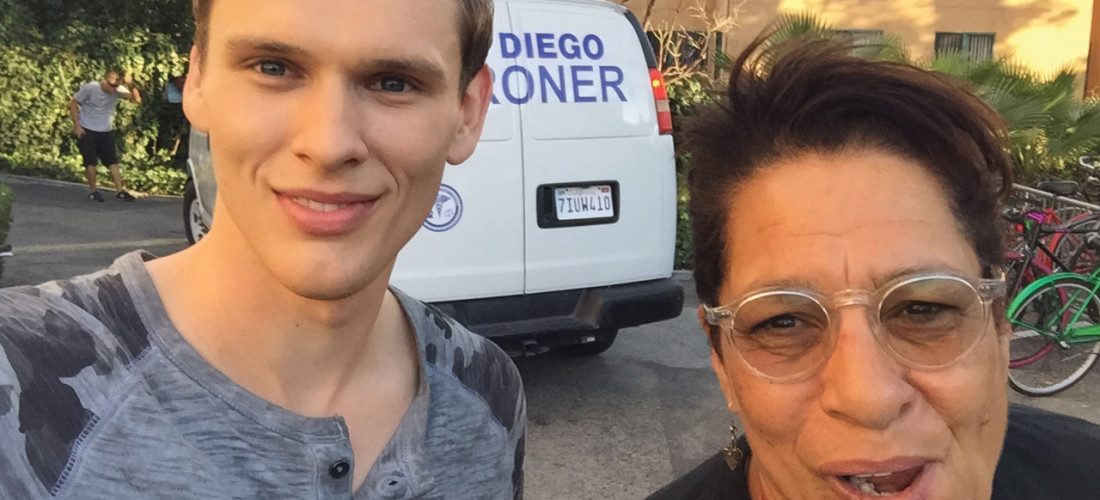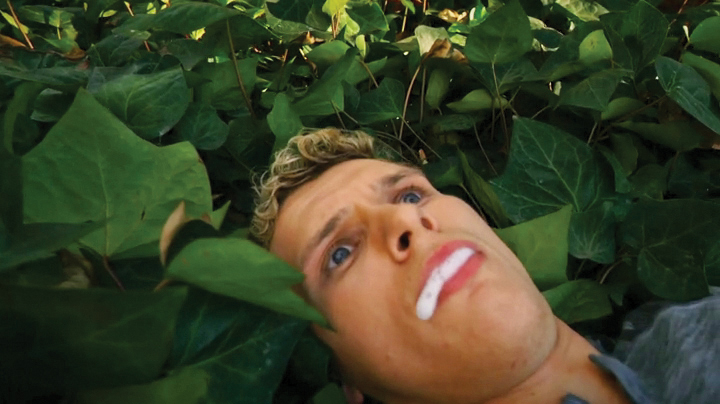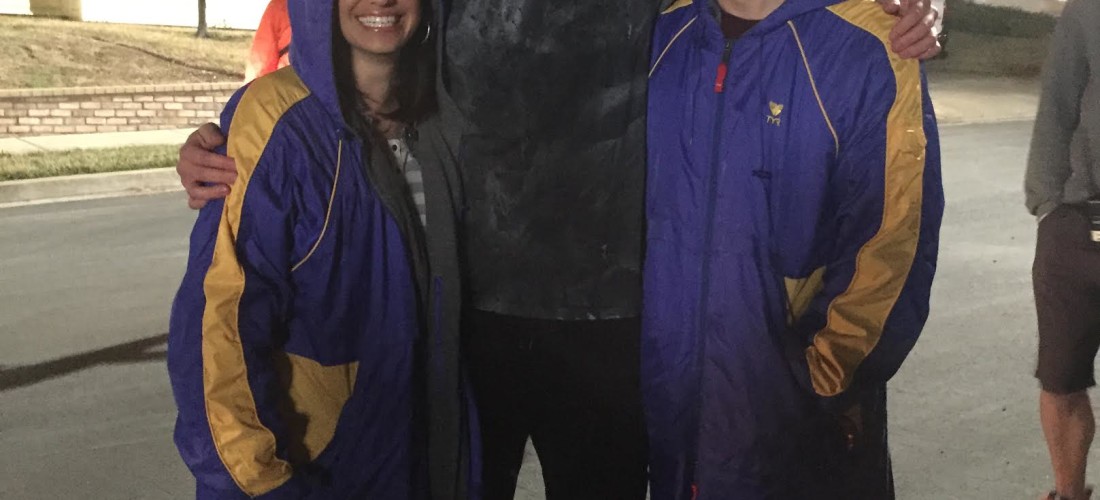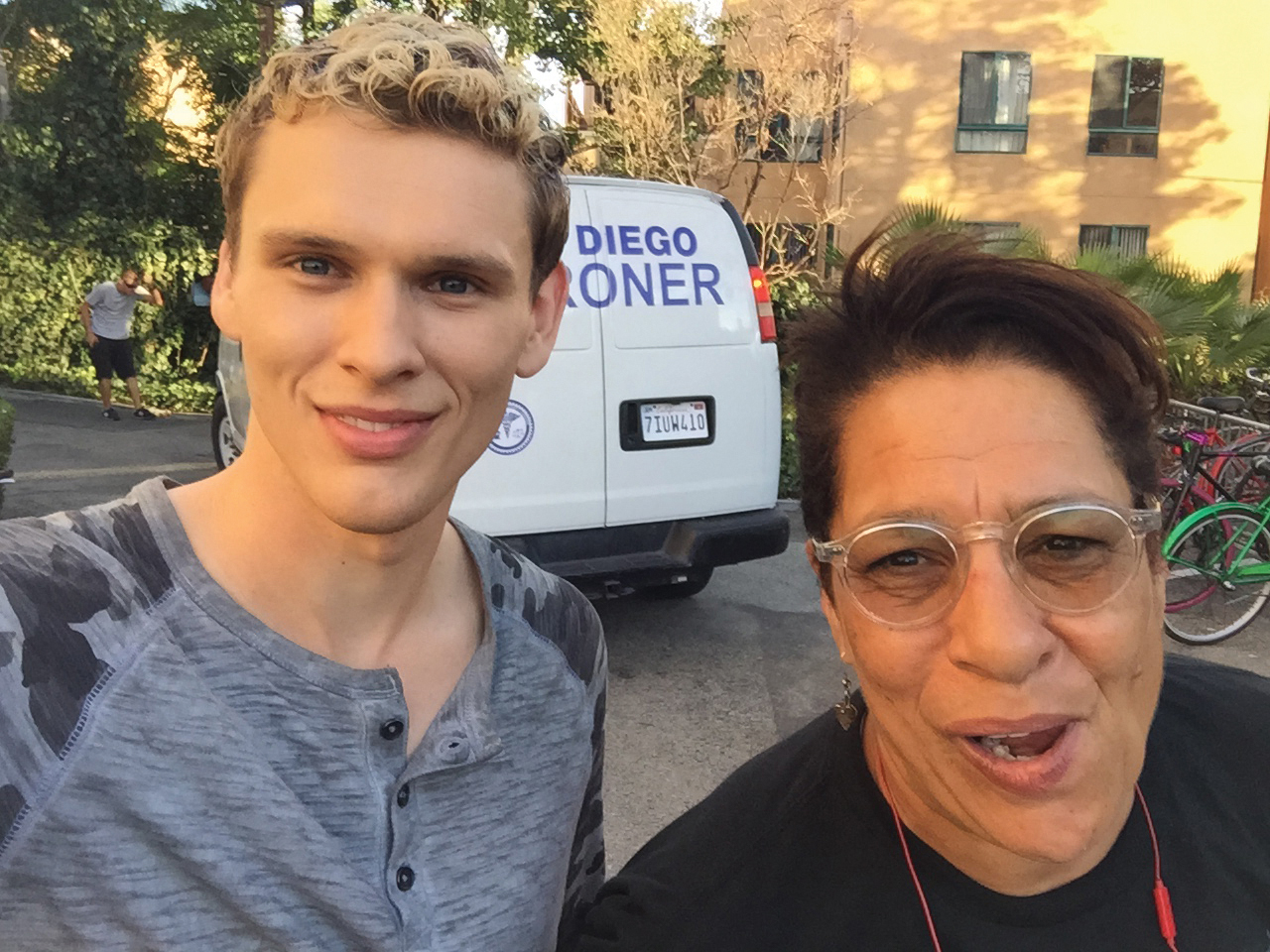
By Judah Breitbach
Carpe Diem. Seize the day. It’s a popular theme often seen in the movies. Peninsula alumnus Sam Towers seized his moment and it took him all the way to Hollywood and the silver screen.
Sam Towers, who attended PC under his legal name, Sam Tack, lived in Sequim while taking classes as a running start student. He was active at school; playing leads in college theater performances, and working in various editorial positions at the college newspaper. Since then, he has played a part in Glee, Castle, Gossip Girl and other television shows.
Towers’ is a board member and the treasurer at a teaching organization for professional and amateur actors called “The Actors Consortium.”
His drama teacher, Lara Starcevich, was a huge inspiration in Towers career journey. He says that her words of encouragement made him realize he might have a career on the screen. She remembers him being a kinesthetic, hands on learner.
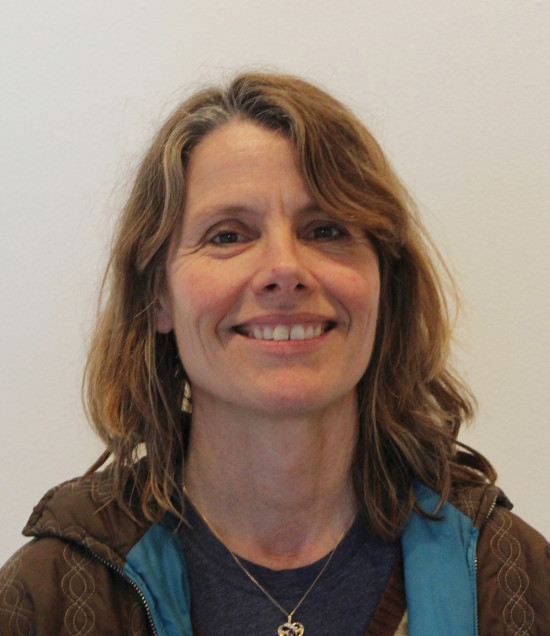
“He often talked about how much he talked about how much he loved Al Pacino and ‘The Godfather.’ Then one time he revealed how, almost every night, he would get a pumpkin pie and eat the whole thing while watching ‘The Godfather,’” says Starcevich.
Sam took some time off between shoots and his job as the treasurer with the Actors Consortium to speak with a Buccaneer reporter about his career trajectory from PC to Hollywood.
J: You worked at The Buccaneer while you were attending PC?
S: I held a lot of jobs. I was the managing editor; I was the news editor. I was part of the Buc staff for about two years. I remember the first time I joined the Buc staff I was 16 years old and doing Running Start. Then I stopped for a quarter, then I came back on staff. I think working on the Buc was probably one of the most fun things I did in college. Just having the relationship I had with the staff, the late nights getting the paper to press and everything.
J: Obviously you’re not in journalism now, but how much does your background in journalism; the critical thinking, the communication skills, the analytical thought process translate to what you’re doing now on stage?
S: No, but I wish I were still in journalism. It’s something I loved doing. I love it to this day, and it’s something that I’ll always love. What I do now is similar, It’s storytelling in a way. When I get a role and I have to break it done it essentially follows the same pattern as any story and you look at it and you immediately see what’s important. Just looking at what needs to be brought out, what needs to be put in the first paragraph, so to speak, so that you’ll want to keep reading. The analytical thinking helps with identifying the critical moments and highlighting that.
J: Did you take any classes with our drama teacher, Lara Starcevich while at PC?
S: Yeah, I know Lara. One of the very first class I took at PC was intro to theater with Lara. I actually give her a lot of credit for some of the stuff that I know. It’s funny, because I think I did two or three quarters of different drama classes with her. When I left Peninsula College, I talked with Lara about an opportunity I had to go to New York. I was considering messing around and dabbling in acting there. I don’t remember her exact words, but they were something like, I think you can do it. I think as simple as that was, that went a long way with me. It made me feel like, well hey, maybe if my acting teacher thinks I can do this, maybe I can do it.
J: I took a drama class with Lara too. I was terrible at it, but she was always super supportive of us.
S: Yeah, to be honest with you I don’t know how good I was either. Coming from where I am now, I was probably terrible too, you know? But she was incredibly supportive. She made it so much fun. She made acting fun. She made learning about it fun, and I had such a good time with it that I was like, hey, I might paid to do this.
J: Was your Intro to theater class here at PC your first taste of the stage? Or had you been acting previously?
S: At best I had dabbled, you know? I mean, I had done some children’s theater a little bit when I was young. I took performing arts one year when I was in middle school. But it was definitely the first in my adult life. PC was my first real experience in theater, in acting since I was in the seventh grade.
J: So you mentioned something about New York and heading over there to act, and Lara supporting you. Was that something you did immediately after PC?
S: I actually transferred schools before going to New York to act. I went from PC to Evergreen State, and I did that for one reason. I went to Evergreen specifically because they offered Independent Study contracts, which means I could write up a contract, which I did pretty much immediately. Then I had to find a faculty member to sponsor me. So I wrote up a contract about the history of film and Jewish immigrants in film. So I wrote up that contract, and I went to New York to study it. So I’d say about six months after PC I was in New York.
J: Were you going to New York for school, or to audition?
S: I didn’t really know what I was doing, to be honest with you. I saw an opportunity, and I took the opportunity. I think I was just trying to get closer to the community of actors, and acting. And just figure out my way, you know? Like who am I? Where am I going? I went there and I got a lot of information, a lot of guidance about what I needed to do, and the complexity of the steps you need to take so far as joining the union. I ended up realizing pretty quickly that I didn’t need to be in New York; I needed to be in Los Angeles. I mean, if you want to do stage acting New York is great place. But if you have your heart set on TV or film then you really need to be in LA. Your opportunities are much greater in LA. So I ended up coming back to Sequim to spend the summer saving up money. Not a lot of money, just a few thousand dollars. Then I just drove to LA. I got here, and that was when everything started moving in the direction I’m heading right now. I didn’t have a place to stay at first. It was a long process. I actually got scouted to model. So that was my first gig, modeling for Abercrombie & Fitch. I hated that, but that’s when I found a manager, and I started taking a lot of classes and studying at a lot of different acting schools.
J: So Things were kind of slow going for you at first? You played a part in some well known TV shows like Glee, Castle and few others. What kind of projects have you worked on since taking your shot and moving to LA?
S: Yeah, that’s the film and television stuff, I also did a lot of theater. I also studied a lot; I became the youngest member of a group called The Actors Consortium. I actually lied about my age to get in; I was 20 or 21. I studied there, I’m still apart of it, I’m an active member. The first thing I did as I got scouted and got a model gig was get a manager who took me on. After that, I started going out on auditions pretty quickly, even though I didn’t know what I was doing. I started booking things slowly but surely. And you know, our union, The Screen Actors Guild has the highest unemployment rate in the country. So it’s very hard to get work. Very few people get work. By no means do I have a cemented career, and by no means am I a star name, but I have been fortunate enough to make money doing it, which is fun. So it’s cool, because if you get, I think two jobs a year or something the union considers you a working actor, which is pretty hilarious because it’s not a lot of jobs. I did start booking relatively quickly though. When I say relatively quickly it’s really hard for anyone not in the industry to understand what you mean by that. As a profession it’s a weird thing because you audition, then you wait and wait, then you audition again then you might work for a little bit, then you wait for the next audition and do it over again, you what I mean? So it’s just a really long process, but it is what it is.
J: It sounds like it was kind of a carpe diem thing where you went to to New York, then came back here to earn your $2000, then went down to LA and got a couple gigs and have been plugging away at it for a while. You had to do a “This I Believe” personal statement video for a class you took with Rich Riski here at Peninsula. You said in the video that whatever you put your mind to is going to be done. Is that kind of the mindset you had through this whole process?
S: Yeah, that pretty much sums it up. I think that what happened was that, like a lot of college kids, I didn’t really have a set path. I didn’t have a safe route, you know? My parents wanted me to be a doctor. But I didn’t have anything that called to me. The only thing I really enjoyed and was drawn to was drama. So, like you said, I just decided to go for it. Just move to LA and do it. I had finished running start, so I was already well ahead for my age and for where I was in life. So I think I had a little bit of time to find it, whatever it was.
J: Can you talk about the project you’re working on right now?
S: I can’t tell you a lot about that. I can tell you I’m working on a pilot episode for Comedy Central, and that’s about all I can tell you right now. I can’t say a whole lot right now, because they don’t want people to know what’s in development. I can tell you the idea for the pilot came from the writers of a web series. Kind of like “Workaholics.”
J: You were working with the Coen Brothers on their new film, “Hail, Ceasar” before your role was cut from the film. What was that like?
S: Again this is really hard to explain unless you’ve been down here in the industry. It’s one of those things you just learn to deal with. I mean, the first time I got cut from something, and I don’t even remember what it was, but it was really tough. I was crushed by it, but you learn it’s just part of it. It happens all the time. But yeah, after they were finished shooting “Hail, Ceasar,” a casting director I know came to me and said, hey we’ve got some pickups on for this movie, and they didn’t tell me what it was for. But basically, what a pick up is is when I’m done with a movie and they have extra money or extra scenes to shoot they do what’s called a pick up. In my case it was two or three scenes for “Hail, Ceasar.” After I was done they decided the scenes weren’t working for the film, so they didn’t use them. But it was a great experience working on set with them. I mean, it was by far the biggest thing I’ve worked on with some of the better people I’ve worked with. It’s by far the biggest budget I’ve worked on. I mean “Castle” and “Glee” had big budgets for TV, but they’re not film budget of millions and millions of dollars. I mean, it’s not the budget of an action movie, but for what it is, it’s pretty big. But they do get a lot of stars; a lot of people who want to work with the Coen Brothers. They’re fun to work with because they write and direct all their stuff. It’s interesting because the last year it’s been a balance of things because I took some of the money I made from acting and opened several different businesses. So we’ve got a jewelry company that’s doing really well. But it’s weird trying to split my time between creativity on set and auditioning, and then going back and doing business. It’s very all over the place.
J: That’s interesting how invested it sounds like you are in the business side of things.
S: Well I think you kind of have to be, in a weird way. Again, this is my own opinion, but I do think this is why you see so many people kind of lose their minds, for lack of a better word, down here in LA. It’s just because the show business is so hectic and so inconsistent, and you know, if you don’t have something going on outside of it when you have a long period of down time after you get cut from a project or whatever it’ll weigh on you and people don’t really have anything to fall back on as far as stability. The stability is probably the most priceless thing you can find in yourself down here.
J: Do you have any goals in mind moving forward for your business, onstage, or even up here on the peninsula?
S: Oh boy. You know, as far as the business goes, our jewelry business, Angel City Jewelers, is doing really well. Basically what we do is pieces for celebrities like Post Malone and Michael Costello. I would like to see that business continue down the path it’s going and expand and grow into something that can expand to different locations like New York, or Miami or Vegas. This is a tough one; as far as acting goes, I think my biggest goal is to keep heading down the path where I continue liking it, you know? I mean, you can get burnt out really easy on something like acting, and like I’ve, I’ve been really luck that I’ve been able to comedown here to work and do what I love. A lot of people come down here for five years and they don’t have anything to show for it. I got fortunate in that I got to work here. I want to keep working, but I also want to challenge myself even more than I have up to this point and do that by trying to be a part of projects that I really feel are high quality and dynamic, I guess you could say. Working on “Workaholics,” was a blast working on, but it wasn’t challenging. Don’t get me wrong, I love working on those projects, but I’d like to be able to choose my scripts more carefully in future.
J: You mentioned the difficulty of working in the industry with the actor’s union and how two jobs a year is a good gig. Are there any distinct obstacles that stand in your way?
S: Honestly, the first obstacle is just becoming a part of the union. It’s like a catch 22; you can’t join the union without acting experience, but you can’t get acting experience without being in the union.
J: Is there any significance to your stage name “Towers”?
S: My first manager wanted a stage name and I was having a hard time because I had never thought about changing my name. He asked what my favorite thing in Hollywood was and I said the Warner Brothers water tower, so he chose Sam Towers. At first I wasn’t super about it, but it caught on and it ended up sticking.
J: Drama Professor Lara Starcevich remembers you eating pumpkin pie and watching “The Godfather” most nights. How did you start the tradition? She mentioned you were a big Al Pacino fan. Was his portrayal of Michael Corleone in “The Godfather” something that maybe inspired you?
S: I don’t know about ‘most nights,’ but I have definitely that done that before. I do love “The Godfather” and Al Pacino. I think watching Pacino in “The Godfather,” “The Scent of Woman,” and “Scarface” definitely inspired me to act. I did watch “The Godfather” repeatedly. I also loved “Raging Bull” and “October Sky.”

